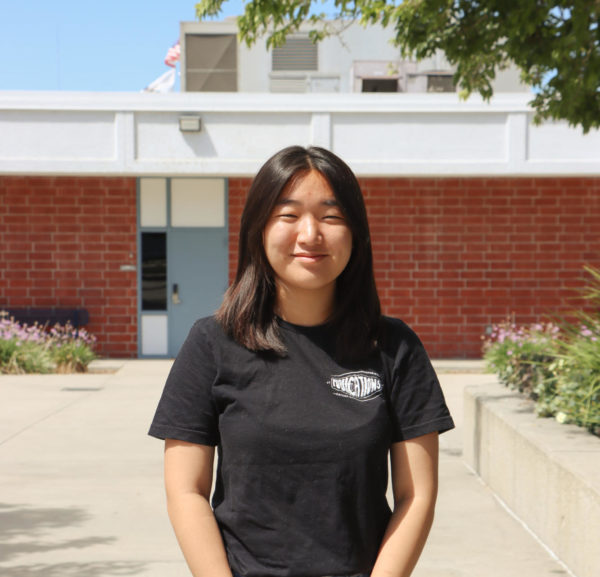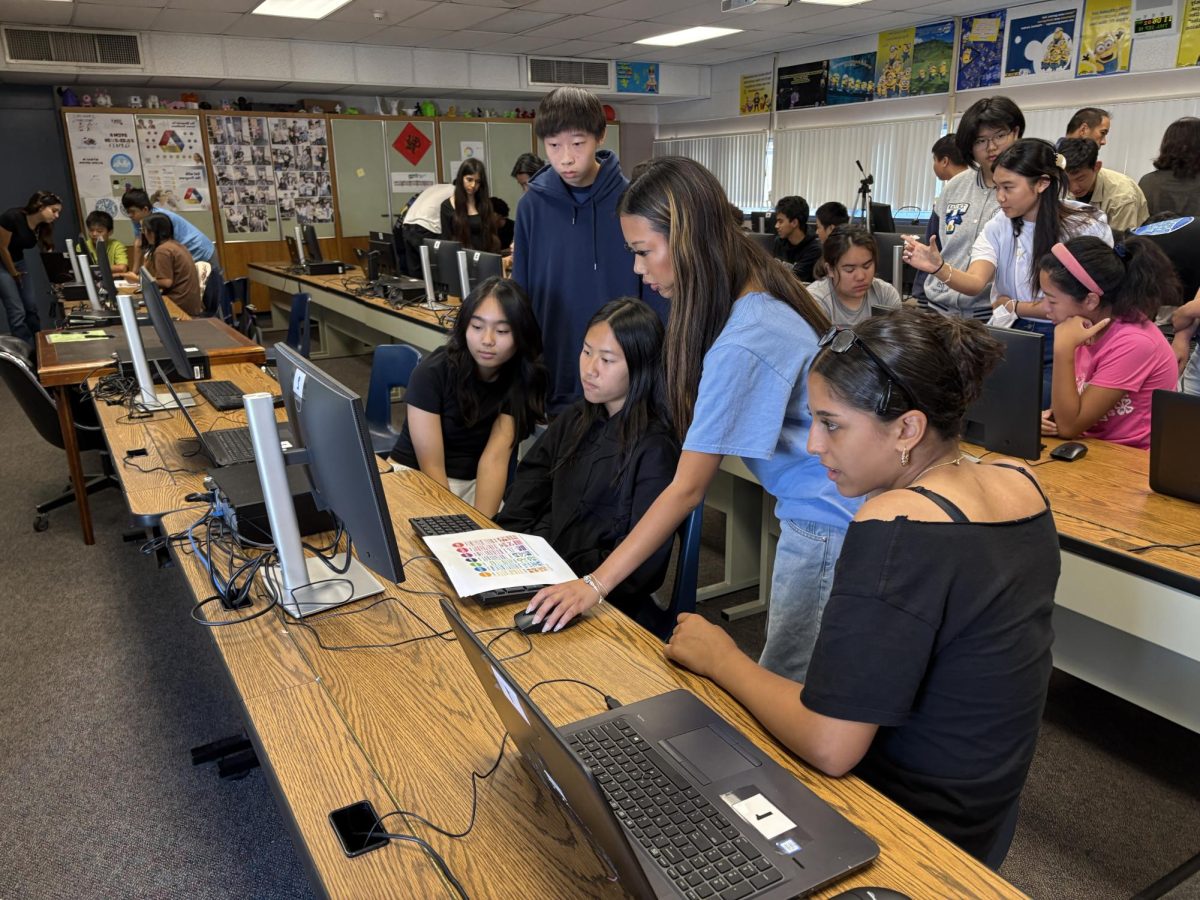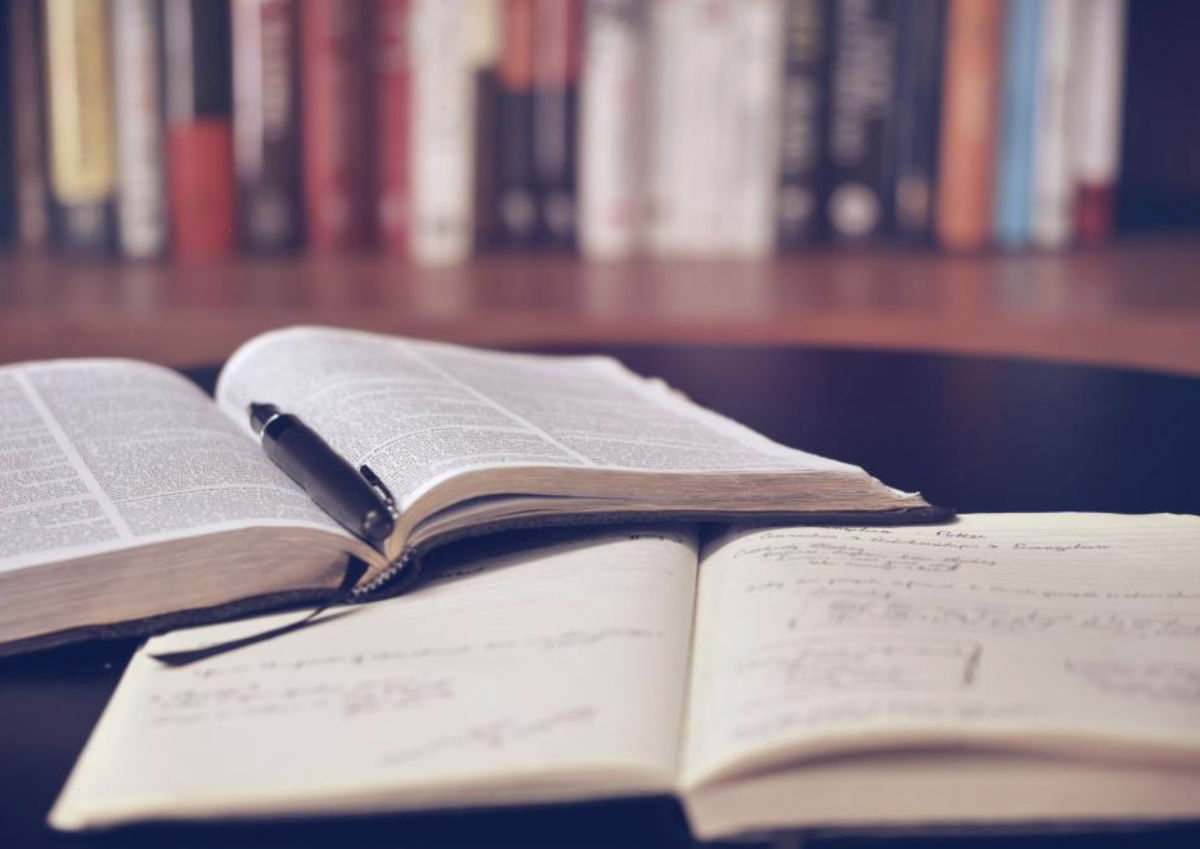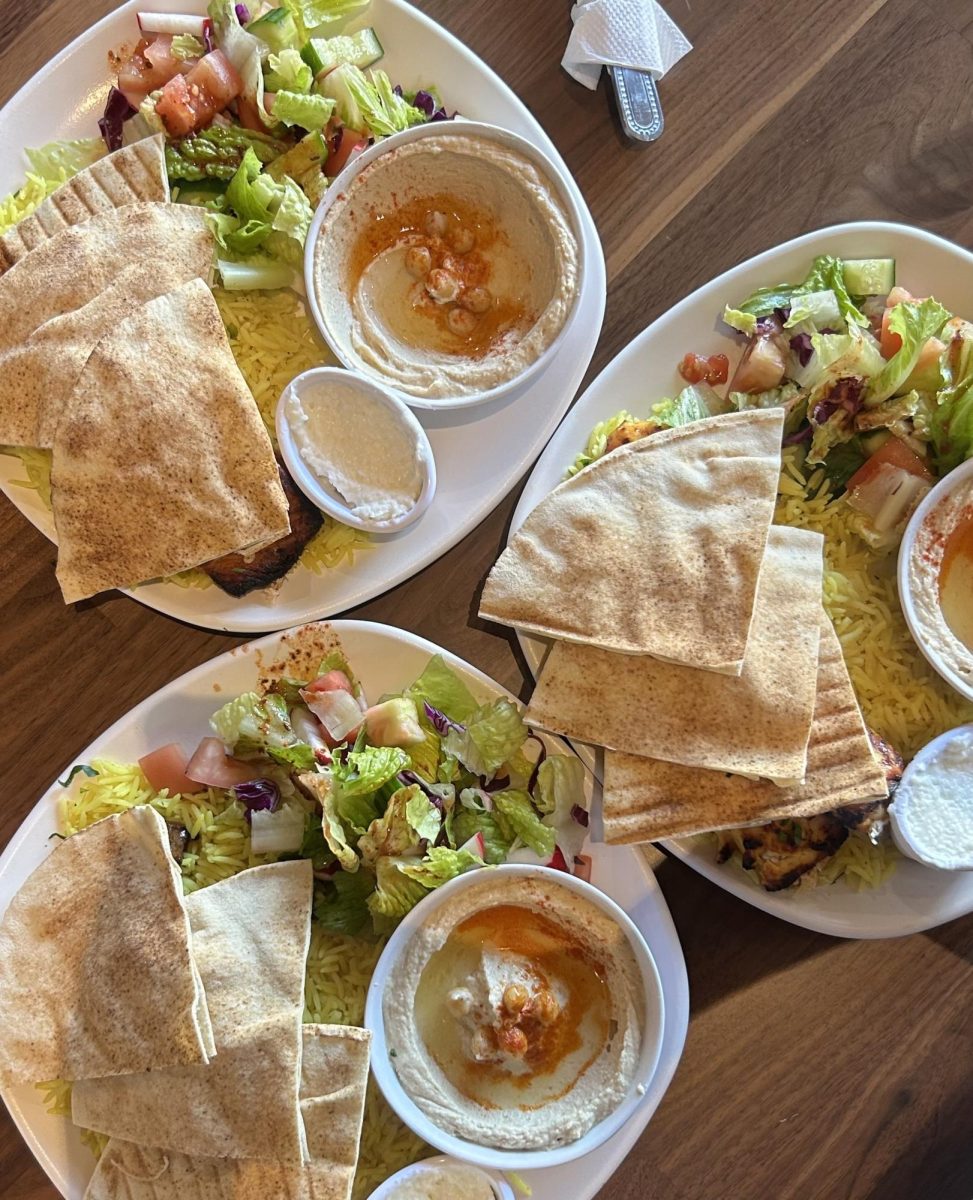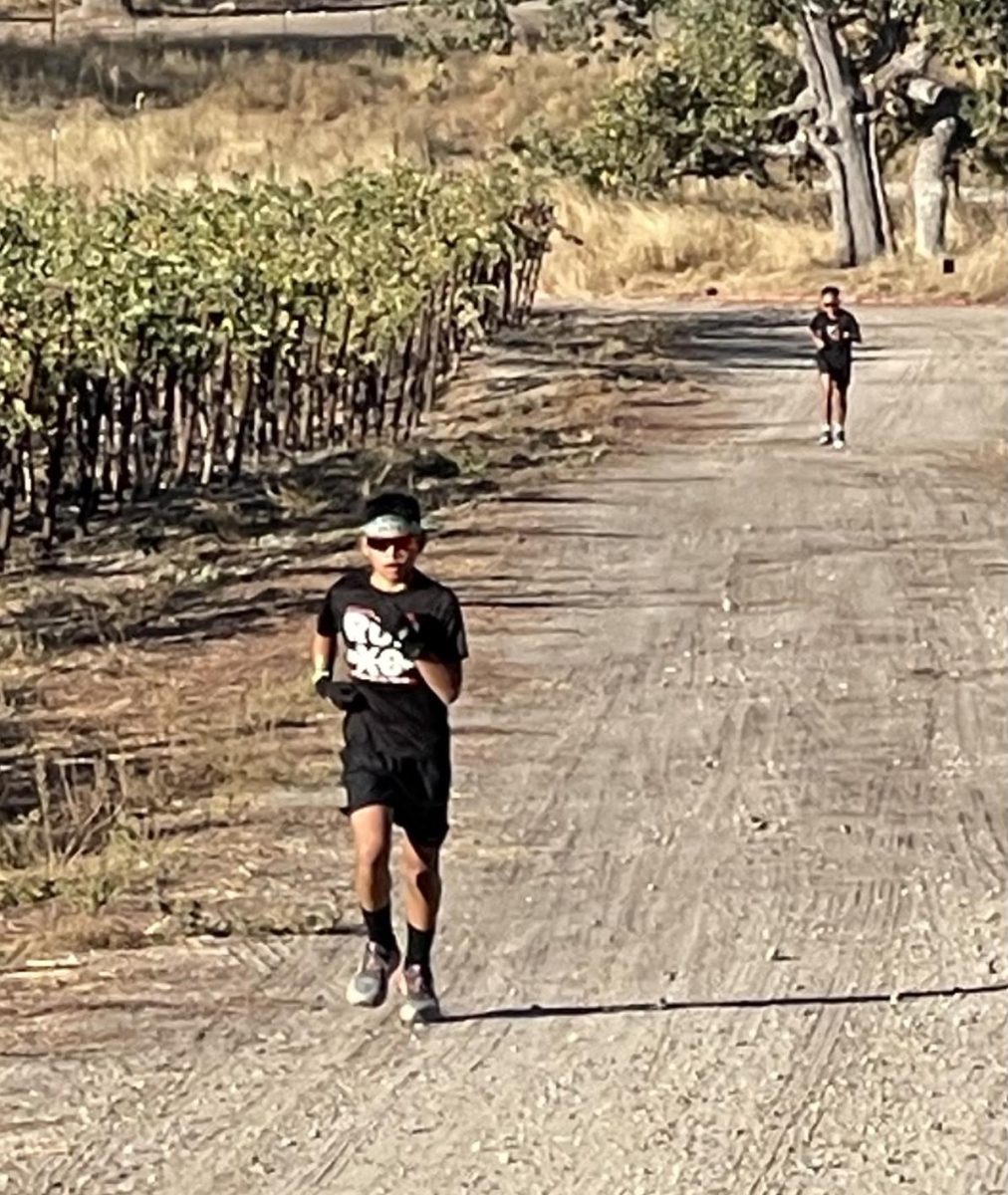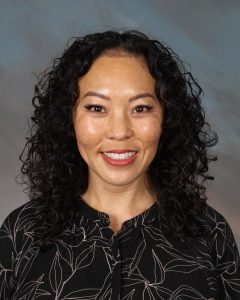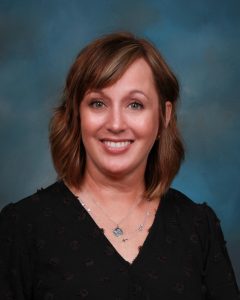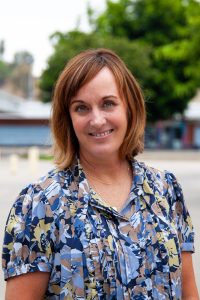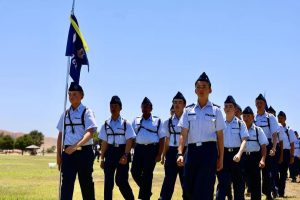In these unprecedented times
April 25, 2022
*All names mentioned below are pseudonyms used to protect the privacy of the individuals involved.
Introduction
They all thought it would be over by now. Surely, the masks would come off, the fighting would stop, the computer would work again. Surely, they thought, this cannot last. Not here, and not in the 21st century. But it persists — stubbornly — along with the friendships maintained only through a screen, the shouts that too-thin walls can’t quite hide, the Zoom meeting that never launched. The COVID-19 pandemic’s not over, not by a long shot, and all they can do is hang on.
Virtual Independent Study
The midday sun casts its expectant shadow over Olivia as she sits in front of her computer. It’s 12 p.m., a Tuesday, but she’s in no hurry to start her schoolwork. She has all the time in the world, after all; the tinny regulation of a school bell is but a faint memory two years in her past.
Slowly, unhurriedly, she settles into a routine she’s perfected over the last three months — no, not exactly a routine: Either waking up or just going to bed at 4 a.m., it’s more like the absence of one.
The virtual Independent Study program gives Olivia the most freedom she’s ever had; the line between success and failure is drawn solely by the keystrokes of her computer. Sure, there are emails and weekly check-ins over Zoom, but when her world is condensed onto screens within the walls of her house, her responsibilities become as easy to ignore as closing her computer. “You have to force yourself to work, to want to do it every single day,” she said.
Olivia first committed to the Independent Study program just as Sacramento legislators were cementing Assembly Bill 130 (nicknamed the “Independent Study” bill) in legalese during July of 2021, back when COVID-19 infection rates skyrocketed alongside the temperature in a bout of summer freedom. It had seemed safer, then, to stay home, for no rule in the world can be enforced well enough to prevent kids from being kids. (She knew from first-hand experience. She has a little brother, after all.)
Including districtwide distance learning in 2020, Olivia has been perpetually home since the latter half of her eighth grade year. Recently, when her parents drove by her high school, she was excited, almost embarrassingly, to see the campus filled with people again, to see faces she recognized and faces she didn’t. It was so exciting, so alive — the proximity of people blurring into one dazzling, vibrant mass of humanity. She couldn’t wait to be a part of that again.
And she will be, in just a few more weeks; she’ll be the new kid in school for the first time in her life. She only wishes, however, that her return to campus is because of a reason other than her academics.
She had to sign a contract at the beginning of the school year before enrolling in Independent Study, and she remembers its resolute 12-point font, warning that missing three consecutive assignments will result in an evaluation of her placement in the program.
“I missed one assignment, but that prolonged and became three and became seven,” Olivia said. “It began going up so quickly that it became overwhelming. I ended up just pushing it away.”
After her meeting with her grade level coordinator (GLC) on Oct. 15, Olivia was made aware, firsthand, of what an evaluation entailed. In her case, it was a suggestion that expected to be followed: Olivia would be given until Oct. 29 to catch up on her missing assignments before reenrolling in in-person education in early November of 2021.
But Olivia tried her best in Independent Study, she really did. She would set a timer for 35 minutes, forcing herself to focus and complete her work, staring at the assignment on her screen until the blue light strained her eyes. Alone in her room, however, surrounded by 15 years of living and kept on track by nothing other than her own will, there always was something else that demanded her attention. The timer can be paused, after all. It was so easy to pick up her phone when monotony made time seem an infinite luxury.
In a neverending loop, Olivia repeated the same procedures day after day. “You get lonely, and you get sad being all by yourself,” she said. She missed the unpredictability of school and her peers that always managed to entertain. She missed her friends, especially how they used to spend their lunch, full of laughter and jokes and little spontaneous moments of connection that just can’t be replicated over texts. “I took breaks by hanging out with my friends. That’s what school meant to me,” Olivia said. “It’s what I always looked forward to.”
She tried to fill her time with exercising, meditating, watching Netflix, crocheting, reading about her world. She spent time with her family, enough to bring out the worst in each other, but also enough to work through conflicts and become as close as they’ve ever been. Olivia had a life to replicate within her new, isolated environment, but still something was missing, an intangible thing that she could not find on the outside.
She had always struggled with it, simply being okay with herself and humanity. Looking inwards, for example, and finding companionship within herself. Not passivity, but realizing that there are some things on the outside she cannot control. “I started doing things I liked. I started paying attention more to my own needs instead of depending on other people to take care of me,” Olivia said.
“The pandemic has been a lesson of reflection. You can see all the bad parts of yourself. I decided to work on [myself] and I’ve grown as a better human being to all people,” Olivia said. “I’m a really social person, and I like being surrounded by people. It makes me feel comfortable. School was like a social gathering, with everything happening at the same time. It’s what made me want to do my work, so I’m excited to be coming back to school soon.”
Credit Recovery
Maria has been playing a catch-up game. Sitting in credit recovery and a seat she doesn’t want to be in, she sees students around her reading, writing, typing — working towards filling their Edgenuity taskbar to 100 percent. The faster they complete their coursework, the faster they can transfer into another class.
The stakes are high for Maria. If she doesn’t make up all her credits by the end of the school year, she will most likely have to transfer to a continuation school, an alternative high school diploma program for students who are at risk of not graduating.
She watches her classmates typing at their computer, faces solemn in concentration. They are wholly focused on finishing their credits and getting out, always looking into the future and what’s to come next. Maria wishes she can do the same.
She looks back at her computer, at her English course and its half-filled progress bar. She’s been working on it since August — “I let myself fall behind,” she said — but watching the seats around her gradually empty only makes her more discouraged.
Credit recovery, like study hall, depends on the student. Everything is self-regulated, the lectures prerecorded and work assigned through Edgenuity with no specific due dates. “It’s just packets of work you have to get done,” Maria said. “It’s through a screen so there’s no real engagement going on.”
The neutered passages, spliced from their original text, blur in front of Maria’s eyes, refusing to make sense no matter how many times she reads and rereads. It seems so pointless, identifying similes and metaphors and personifications. Works of fiction appear much less important when she knows all too well the real-life consequences words can hold.
Before the COVID-19 pandemic, Maria was doing fine academically. School, especially English, had never been her strong suit, but she was still passing most of her classes and getting the credits she needed to graduate. However, during Maria’s second semester in distance learning, she failed all six of her classes. “Everything was so overwhelming. That’s when I gave up,” she said. That’s when she realized that misfortunes never come alone.
At the start of distance learning, Maria had just adopted a puppy from her dad’s friend. It was full of energy and need, wanting to play all the time and in the process of potty training. She thought staying home meant she would be able to spend more time with her dog, but it only seemed to want Maria’s time when she was doing schoolwork. She also shared a room with her younger sister, whose eager participation in class invariably affected her own. However, it was mostly her parents, separated but still forced to live together, that was her main source of stress.
They had begun to grow apart when Maria was in eighth grade, but it wasn’t until the pandemic and its forced proximity did their marriage begin to unravel, showering Maria and her sister with bits of ricocheted antagonism. Their house was turned into a battleground for the children’s affections, forcing them to choose, to learn that love is to possess, as if their parent’s last one-upmanship in their marriage is seeing who could gain the children’s trust.
“She’s evil. She lies and goes behind people’s backs,” Maria’s dad would say, looking around furtively to make sure her mom couldn’t hear.
“Your dad cares more about his friends than his family. He’s stubborn and likes to see things his own way,” Maria’s mother would confide in her, checking to see that her dad was out of earshot.
But she loves both of them, Maria would tell her parents, she loves both of them equally.
Her verbal reassurance isn’t enough, however. Maria and her sister are stuck in the middle — forced to mediate, console and soothe — children used as proxies in a fight between adults, a fight that takes a turn for the worse when alcohol becomes the fifth participant.
“When [my dad’s] drunk, he has a completely different demeanor. He’s a lot meaner and he doesn’t hold back. My mom would say, ‘Don’t talk to him. Don’t interact with him because of the way he is.’ I just ignore him or give him dry comments because it’s not worth arguing with him. It’s just going to make things worse,” Maria said. “When he gets drunk, he would bring up my mom a lot. It made me mad because my dad talks about my mom in a completely different way from what I see her.”
Playing video games is one of the few things Maria does that makes her feel like a teenager, though a bittersweet hobby, She still remembers when her Xbox belonged to both her and her dad, when they would play “Call of Duty” together before he started saying “I’m too tired from work” or “No, not today.”
Through the fast-paced teamwork of shooter games, Maria has made online friends who, despite never having met in person, know her better than anyone else in her life.
“I don’t have to face my online friends, so it’s a lot easier for me. I can get all my worries out and they’ll listen to me,” Maria said. “They don’t have to deal with me because they don’t have to see me every day. They’re not that [involved] in my life, so I feel like it’s easier for me to vent to them.”
All in all, Maria sees the world in a practical light; she does what needs to be done. Credit recovery and continuation school isn’t something that’s good or bad, but merely a result of her actions.
And plus, school isn’t Maria’s priority anyway. When asked if she had a dream for her future, Maria said simply, “to have a family.”
Distance Learning
Polly sat alone in her hotel room. She wanted a break — that’s why she went back to China for distance learning in the first place — but not like this. Not an involuntary break caused by her broken computer she couldn’t fix. She wanted a brief vacation, not something that made her fail her junior year of high school.
A year later, it took Polly two months in credit recovery to make up two semesters of English and one semester of United States history, the courses she needed in order to graduate. “I couldn’t sleep without finishing the standard I set for myself every day,” Polly said, setting herself, at least according to her transcripts, back on track to reaching her goals. What’s changed, however, is everything else, including the method to reach those goals.
Back in distance learning during 2020, Polly had time to think, beginning in a room in Guangzhou that she wasn’t allowed to leave. Just arriving in China from the United States, she was quarantined for 14 days, a requirement for all international travelers who entered China’s borders.
It was the first free time she had in a long while and she enjoyed it, being in that hotel room. The free food, delivered three times a day, was much better than the instant noodles she usually made for herself. She enjoyed it, that is, until she tried to attend her first period calculus class over Zoom.
She sat in front of the computer for 20 minutes, looking at the circular cursor rotating over and over again. Barricaded in her room by government mandate and shrill alarms, she couldn’t get her computer fixed. The cursor continued to buffer the entire time Polly was quarantined.
She emailed her teachers every day. “[Technology issues] is a pretty lame excuse,” Polly laughed, “but in my case, it was actually true.” Her teachers were understanding, but no amount of empathy could make up all the homework, tests and research projects she missed.
By the end of the 14 days, Polly decided with her GLC that it was just easier to take a leave of absence from school, her final grades being determined by whatever percentage she had in her classes at that time. She won’t get to finish her junior year, but Polly knew there was nothing else she could do.
Polly was gone from school for six months. She traveled to Beijing for two weeks before flying to Changsha, where she lived alone in an apartment for two months before coming back to the United States.
“I felt relieved when I knew I wasn’t going to go to school anymore. I know there’s going to be a series of problems after this, but I just felt relieved,” Polly said. “Before, I was doing nothing. I felt super guilty, but I couldn’t find anything to support myself. I couldn’t find the motivation for me to do anything. I was super glad to get a break.”
After her six-month hiatus, Polly had to reregister to be enrolled at school, her classmates treating her as if she was a new student. It’s fitting, in a way: She is no longer the person she was before the pandemic.
Polly is happier now, and she makes decisions based on her own terms. Despite an imperfect academic transcript, Polly is grateful for last year and excited for her future. She may have failed Advanced Placement Chemistry, but she is now the teacher’s assistant for her old chemistry teacher. She may not follow the traditional route she planned with her parents, but she wants to go to a community college and have more time to figure out who she is.
“I was never afraid of people judging me because I know who I am. If I’m doing something wrong, then judge me, but if I’m doing okay and you judge me for no reason, I would not care about it,” Polly said. “Before, I wanted to get into a good college for no reason. I took hard classes I couldn’t accomplish. But now, I will just do whatever I can to have success in [my] life.”
No matter what, Polly can’t wait for her future and whatever comes next. After all, she’s already lost a year, and she’s never been the patient type.

